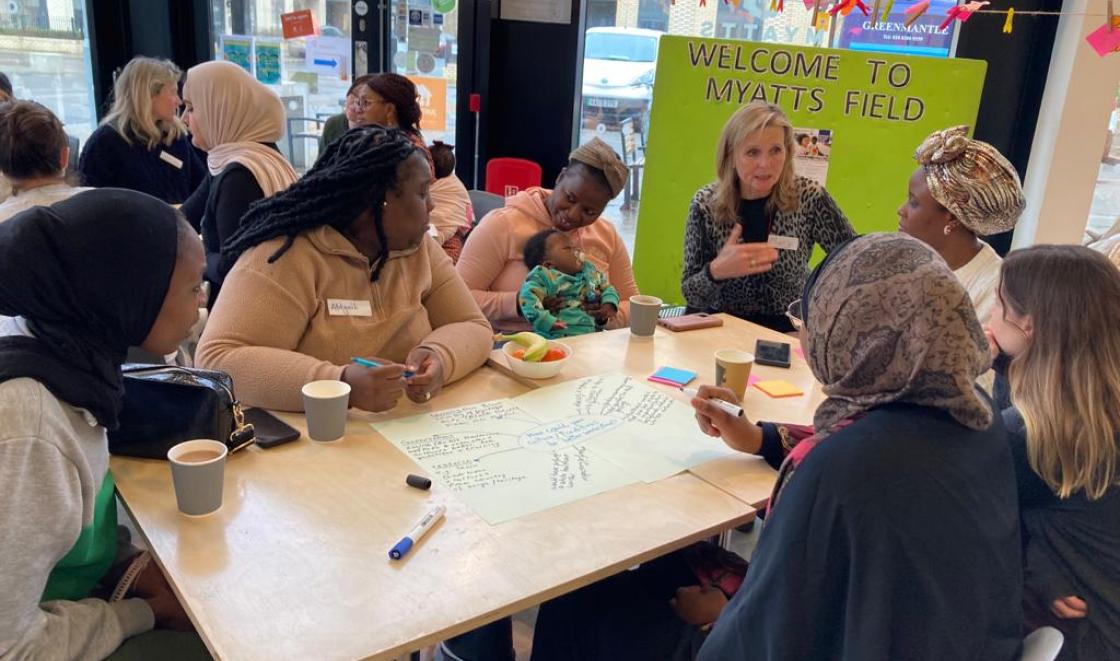Lambeth Parents’ Lunch - Peer researchers facilitate community listening event
Members of ARC South London's maternity and perinatal mental health theme and peer researchers reflect on their co-written report on the Lambeth Listening event.
Members of ARC South London's maternity and perinatal mental health theme and peer researchers reflect on their co-written report on the Lambeth Listening event.
Following a blog by Zenab Barry in the spring, the report of the Lambeth Parents’ Lunch is now published.
The project aimed to find ways to understand how the maternity journey is experienced by a diverse group of south London women to inform research, through co-production and principles of participatory research. It has enabled us to work in ways that the maternity and perinatal mental health theme, and ARCs far and wide, aspire to, focusing on communities, building trust and creating partnerships with groups often excluded from research.

We were able to engage with the populations we want to work with and and feel that an opportunity was provided for communities to be involved on their own terms
Clear enabling communication was prioritised throughout, in the planning and marketing, and in collaborative and inclusive writing up. Visual images have been used to good effect to demonstrate our values and ways of working. Diversity in the research team has been central, and recruitment of women by peer researchers from diverse backgrounds and communities was fundamental to the range of people who attended, and the atmosphere on the day.
Addressing power imbalance is complex and an ongoing challenge. It intersects with available resources of time and funding, with opportunities for training and planning together, conscious and unconscious beliefs and expectations, and different strengths. It is a work in progress in which we aim to value people’s involvement, ask what they want and need, and focus actively on building trust and respect at all levels. Values of regard for people and communities, fairness and working to promote community wellbeing, unite us, and help us to work through differences.
The Lambeth Parents’ Lunch, conducted with peer researchers in a community setting and using participatory research methods, enabled us to be trusted with women’s personal stories about their pregnancy and becoming a mother. They discussed how they fared while using maternity and community health services, including their anxieties, uncertainties, sources of support and good care. They also shared their frustrations and disappointments and some unsafe care. Importantly, the event was viewed positively by the women who attended.
Co-production and events of this kind can provide a real insight into the lived experiences and perspectives of women from diverse backgrounds, who are often not heard.
By enabling the involvement of seldom heard groups in maternity and perinatal mental health research, we aim to make future research more relevant and ultimately, improve women’s and babies’ health and experiences. We believe that these kinds of community activities also mobilise greater community connectivity and resourcefulness, contributing to social capital.
Having clear values and opportunities for training and team building are building blocks for this kind of work. Our recommendations for others organising similar participative community involvement research events include the need to be clear about multiple objectives and the ways they overlap and interact. Teams need to attend to the practical details of how to host a welcoming, accessible, culturally sensitive event; to work on how to achieve a well-integrated team of peer and academic researchers with a clear, shared brief; and also to set research involvement objectives and develop suitable participatory methods and activities. It is no small undertaking.
Although just one event, the design and running of the community workshop was foundational for further collaborative work, with the potential for individual development for the women who took part, and strengthening of community connections and confidence. In September, we held a follow-up ‘pilot’ meeting, with the same group of women, funded by the King's Engaged Researcher Network (KERN), to expand on this work. We used Photovoice as a participatory research method, after training together as a team in the values, purpose and ways of using Photovoice, and will take this forward with a stage II grant.
The writing group for the report was: Mary Newburn, Zenab Barry, Vita Moltedo, Rachael Buabeng, Zoe Vowles, Kaat De Backer, Zahra Khan, Hannah Rayment-Jones, Jane Sandall and Abigail Easter